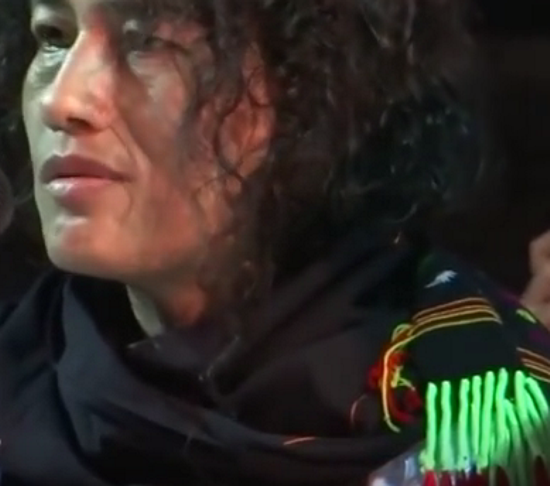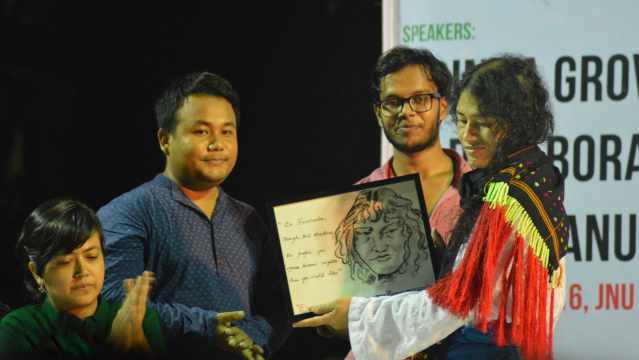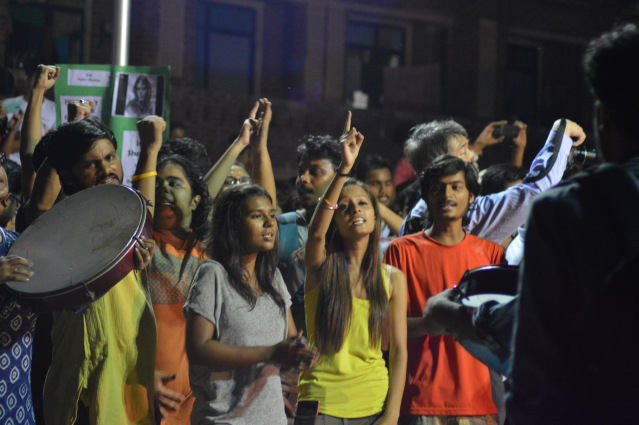The Democratic Students Federation (DSF) organised a traditional meet at the JNU: a post-dinner Public Meeting at Shipra Hostel JNU on the topic Fighting State Repression: Contnuing Democratic Struggles Against AFSPA. The central attraction of the meeting was the presence of Irom Sharmila, an iconic figure for the human rights movement in India.

One can find Irom on at least twelve walls of JNU. She is part of the iconic graffiti. On October 2. the activist was here in the campus addressing the students in person. The usually secluded area of Shipra lawn saw a thousand students huddled together, who had started pouring in as early as seven in the evening to hear Irom Chanu Sharmila speak.
It was an emotional moment for hundreds of activists who admire her as a symbol of resistance against state repression, for scores of artivists who have tried to portray her indomitable willpower on the red sandstone walls of the campus. And for innumerable students, both within and outside the campus; who have known her as the one to have steadfastly opposed the state imposed AFSPA through non-violent means making even powerful leaders take note of her and her cause.
Pushpika Bara, SIS Councillor welcomed the speakers and spoke about Irom’s hunger strike that lasted some sixteen years. She said students of JNU salute her iconic struggle and welcome her decision to end her hunger strike and fight through electoral means. Irom Sharmila had declared on 9 August 2016 after ending her hunger strike that she will contest Manipur Assembly Elections 2017. After which Pushpika added that JNU condemns the Armed Forces (Special Powers) Act, 1958 or AFSPA that grants security forces the power to search properties or arrest people without a warrant; to use deadly force against individuals if there is “reasonable suspicion” that a person is acting against the state; calling it “draconian” and “fascist.” It is shameful for the government to use violence against its own citizens she said. The state of Jammu and Kashmir has been reeling under the same draconian law. Vrinda Grover, the human rights lawyer was also present.
Papori Bora, professor at Centre for Women and Gender Studies JNU, reminded students about the extraordinariness of her strike, stressing on the fact that it’s a lone democratic voice amidst tens of thousands of armed struggles in the Northeast. She expressed her disappointment with the state that has “failed to acknowledge Irom’s struggle;” and questioned the disparity that lies between India and the so-called “Indian” Northeast.
“Coexistence of AFSPA within representative democracy in Manipur is ironical. The Indian Union tries to ‘protect’ [Irom] under Section 309 of Indian Penal Code, thus including her as a citizen when at the same time excludes her by denying to acknowledge her struggle and fast. All her attempts to engage in a dialogue with the state have failed. This exclusion within an inclusion has forced her into a non-space…. Irom truly personifies the Northeast,” she said.

Irom, for some is also Mengoubi or the fair one, as she is popularly known.
One could sense the excitement in the air; students who had occupied front rows early demanding late comers trying to squeeze in to move to backseats. There were North-East students who had come from outside to have a glimpse of her. Frequently some section would break into loud cries of ‘laal salaams.’ While the recent recruits of DSF (the organizer for the event) shuffled around the place with tambourines, to make sure their voice rang the loudest during the naarebazi sessions, the older activists on the other hand in vain tried to keep things (read: people) in order.She then got up, stepped ahead and continued:
“For sixteen long years I followed Gandhian principles and requested governments to repeal AFSPA so that we are given the right to live. My protest has fallen on deaf ears. Now I wish to convey that I want to change my tactic, I will fight in a new way. I will take this to [the] ballot. My fight is not mine alone. It is for Manipur. We live on the same brown planet. When there is a volcano, typhoon, flood: it affects us all. When there is an unjust system, it affects us all… The people’s power can defeat the most unjust forces.”
Twice she oaused asked if she should speak more, and “yes!” bellowed the crowd.She paused, and then she continued:
“It is my belief that the students are the mirror of the society. It is said that when spring comes, it is full of hope and promise. When a bud blooms, it is full of hope and promise. It is my hope, a deep conviction that there is spring in the unity of the youth. If the youth is united, then we can defeat all the evils of the society.”
She conveyed such conviction and faith in the promise of a better future through her presence and gestures that one could sense her ideas taking shape among the audience across linguistic barriers. And when she started in English, slow and broken, those beliefs were further affirmed:
“I appeal to you all, the mirror of the world. Such kind of a unity [that is here in JNU] is not in my native land, full of problems, without any solution, without any guide. When those who are meant to serve us [do not do so], I have to step into the dangerous position and awaken the minds of people…ahead of my announcing the break of my fast, a BJP leader told me that if I have to stand in elections from their party I would need an average of 36 crores. In such dirty system, people are blindly indulged in traps… I hope the whole system of politics need[s] to be modified now.”
She ended, “I wish you all come to Manipur one day,” and then joked, “just ahead of the next elections.”
A wave of slogans in support of Irom’s struggle filled the night air.
“Irom ke sangharsh ko Jai Bheem Laal Salaam.”

The azaadi ones followed too.
“Irom waali azaadi, Manipur me bhi azaadi, AFSPA se lenge azaadi.”
